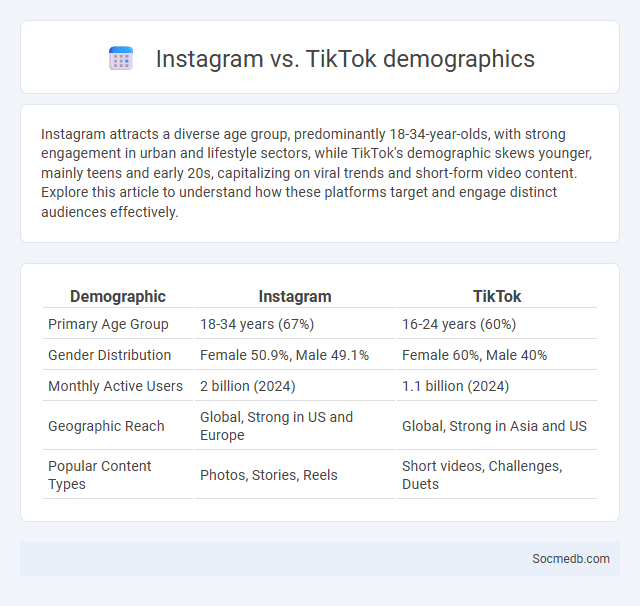
Photo illustration: Instagram vs TikTok demographics
Instagram attracts a diverse age group, predominantly 18-34-year-olds, with strong engagement in urban and lifestyle sectors, while TikTok's demographic skews younger, mainly teens and early 20s, capitalizing on viral trends and short-form video content. Explore this article to understand how these platforms target and engage distinct audiences effectively.
Table of Comparison
| Demographic | TikTok | |
|---|---|---|
| Primary Age Group | 18-34 years (67%) | 16-24 years (60%) |
| Gender Distribution | Female 50.9%, Male 49.1% | Female 60%, Male 40% |
| Monthly Active Users | 2 billion (2024) | 1.1 billion (2024) |
| Geographic Reach | Global, Strong in US and Europe | Global, Strong in Asia and US |
| Popular Content Types | Photos, Stories, Reels | Short videos, Challenges, Duets |
Overview of Instagram and TikTok
Instagram, launched in 2010, is a visual-centric social media platform emphasizing photo and video sharing with features like Stories, Reels, and IGTV, boasting over 2 billion monthly active users as of 2024. TikTok, emerging in 2016, specializes in short-form video content driven by an algorithm that personalizes user feeds, capturing more than 1.5 billion monthly active users globally. Both platforms dominate social media engagement by blending creative tools and influencer-driven trends, essential for brand marketing and digital communication strategies.
Global User Demographics Comparison
Global social media user demographics reveal significant variations in platform popularity across regions, with Facebook dominating in North America and Instagram leading in Europe and parts of Asia. Age distribution shows younger users gravitate towards TikTok and Snapchat, while older demographics prefer Facebook and LinkedIn. Understanding these patterns helps you tailor content strategies for maximum engagement across diverse international audiences.
Age Distribution: Instagram vs TikTok
Instagram predominantly attracts users aged 18 to 34, with approximately 67% of this demographic actively engaging on the platform, reflecting its strong appeal among young adults. TikTok skews younger, capturing a significant share of users aged 16 to 24, which accounts for nearly 60% of its monthly active users globally. This age distribution highlights TikTok's dominance in the Gen Z market, while Instagram maintains a broader audience within Millennials and older Gen Z cohorts.
Gender Split Analysis
Analyzing the gender split on social media platforms reveals critical insights into user demographics and engagement patterns, with women often dominating platforms like Instagram and Pinterest, while men show higher activity on Twitter and LinkedIn. Understanding these gender-based preferences helps tailor content strategies to maximize reach and interaction. You can leverage this data to refine marketing campaigns that resonate more effectively with your target audience's gender-specific behaviors.
Geographic Penetration and Popularity
Social media platforms exhibit varying geographic penetration, with regions like North America and Europe showing high user adoption rates, while emerging markets in Asia, Africa, and Latin America demonstrate rapid growth. Popular platforms such as Facebook, Instagram, and TikTok dominate globally, but regional preferences like WeChat in China and VKontakte in Russia influence local engagement significantly. Understanding your target audience's geographic location helps tailor content strategies to maximize social media reach and popularity.
Socioeconomic Status of Users
Social media platforms attract users from diverse socioeconomic backgrounds, influencing content consumption and engagement patterns. Your access to high-speed internet and advanced devices often correlates with higher socioeconomic status, impacting the quality and frequency of online interactions. Understanding these disparities helps tailor digital marketing strategies and ensures equitable access to social media benefits across all income levels.
Usage Patterns Across Platforms
Social media usage patterns vary significantly across platforms, with Facebook showing high engagement among users aged 25-34, while TikTok dominates the 18-24 demographic through short-form video content. Instagram's visual-centric interface encourages frequent interaction via Stories and Reels, driving daily active usage that surpasses 500 million users. LinkedIn, focused on professional networking, sees peak activity during weekday business hours, reflecting its role in career development and industry insights.
Content Preferences by Demographic
Younger audiences, especially Millennials and Gen Z, prefer video content and interactive formats on platforms like TikTok and Instagram. Older demographics, such as Baby Boomers and Gen X, tend to engage more with informative articles, news updates, and community-focused Facebook groups. Tailoring social media strategies to these content preferences by demographic significantly improves engagement and brand loyalty.
Brand Engagement and Influencer Impact
Social media platforms significantly boost brand engagement by fostering direct interactions between Your audience and content, enhancing brand loyalty and recognition. Influencer impact drives authentic connections, leveraging trusted voices to expand reach and influence purchase decisions effectively. Strategic collaborations with influencers amplify engagement metrics, resulting in measurable growth in brand awareness and customer trust.
Future Trends in Social Media Demographics
Future trends in social media demographics reveal a significant rise in Gen Z and Gen Alpha users, driving demand for platforms emphasizing video content and interactive experiences. Increasing diversity and inclusion will shape content creation and algorithmic prioritization, ensuring your social media engagement resonates across multicultural audiences. Brands leveraging data analytics to understand evolving user behaviors will gain a competitive edge in targeting these dynamic demographics.
 socmedb.com
socmedb.com